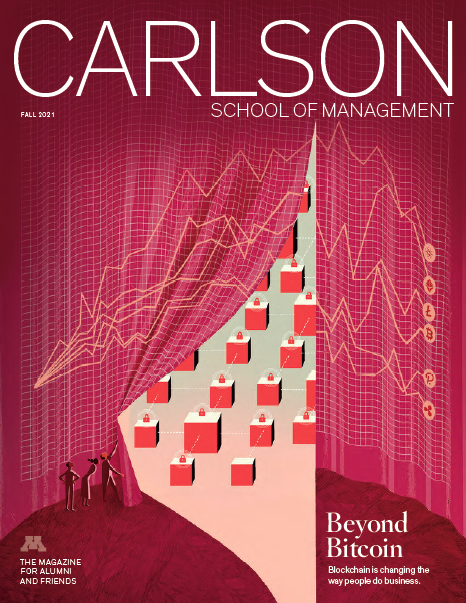
‘Do Something’
Friday, October 8, 2021
BY WADE RUPARD
20 years later, Tom Burnett’s legacy lives on.
On a recent trip to Washington, DC, Jeff Swanson, ’86 BSB, stopped and took a long look at the White House.
It wasn’t his first time seeing the landmark. He wasn’t in awe of the architecture, the history, or the importance of the building. Instead, he was thinking about how without his friend, Tom Burnett, ’86 BSB, the White House—or the U.S. Capitol—may not be standing.
Last month, we commemorated the twentieth anniversary of the September 11 attacks, which killed nearly 3,000 people that Tuesday morning. The death toll, however, may have been considerably worse if not for Burnett and others aboard United Airlines Flight 93.
After learning through phone conversations with family members that hijacked planes had already hit the World Trade Center in New York and the Pentagon in Washington, DC, Burnett and a few fellow passengers decided to take control of the plane to prevent it from hitting another target. Burnett called his wife from the plane, told her he’d be home for dinner that night, and signed off with the last words she’d ever hear from him: “We’re going to do something.”
At 10:03 a.m., the Boeing 757-200 crashed into an open field in rural Stonycreek Township, Pennsylvania, killing all 44 people on board. The crash site is now home to the Flight 93 National Memorial, which permanently recognizes the heroic actions that took place just 20 minutes flying time from our nation’s capital.
Fast Friends
Burnett and Swanson were both involved in Alpha Kappa Psi, a University of Minnesota business fraternity. They became fast friends when Swanson learned Burnett’s father was one of his teachers in middle school.
Burnett made an impact on Alpha Kappa Psi right away. In his first meeting as a new member, he spoke up to ensure everyone in the group was treated fairly. He became well-liked, known for his magnetic personality.
The spark of courage exhibited as a college student in a chapter meeting continued in Burnett’s final moments in the sky.
“That day (September 11) had a profound impact on me,” Swanson says. “I think of Tom and that day often. His words to ‘do something’ stick with me and it’s something I believe in and something we shared. I’ve taken that with me over the past 20 years and try to ‘do something’ myself. Obviously, it’ll likely never be something as big as what Tom did, but I try to make positive change as often as I can.”
Following his death, Swanson had the idea to start a leadership program as a way to honor his friend.
“Tom was always somebody people gathered around,” Swanson says. “By definition, to be a leader, you have to be followed, and he was always being followed. It felt fitting to start a leadership program in his name as a way to prompt growth and have people practice courageous behavior in their everyday lives.”
Burnett’s family eagerly got behind Swanson’s idea.
“We talked about that when we set up a family fund, it should be about leadership and citizenship,” says Martha Burnett Pettee, Tom’s sister. “I’d ask [Tom] about [his children] and he’d say, ‘They’re going to be good citizens, Mart.’ To him, that meant they would be well educated, informed to make important decisions to keep our democracy alive.”
“Tom was always somebody people gathered around. By definition, to be a leader, you have to be followed, and he was always being followed.”
The Tom Burnett Family Foundation supports several programs and initiatives that keep his legacy alive. A new scholarship for Carlson School students is the latest addition. One of the longest-standing is the Tom Burnett Advanced Leadership Program, which is part of the Office for Student Affairs at the U of M Twin Cities campus. A small group of seniors from various U of M colleges come together for eight weeks of intensive leadership skill building, as well as life and career mentoring. For participants, such as Kelsey Wise, ’12 BSB, the experience was invaluable.
“Up to that point in my life, I had won a ton of accolades and I felt I had to be perfect all the time,” says Wise, currently vice president of business strategy and operations for the A-Rod Corp. “And looking back, that may have distanced people from me. So, I took this time to listen, better understand people, and try to empathize with them. I learned a lot about myself and what leadership means to other people across a wide variety of disciplines.”
Madison Schwartz, ’19 BSB, saw similar benefits.
“It was the perfect complement to my Carlson School education,” says Schwartz, now a project coordinator at Microsoft. “Carlson taught me many lessons including how to lead in the workplace, how to navigate complexities in our ever-changing world, and how business can be a force for good. I also learned the hard skills of the business world, how to problem solve, and be innovative. The leadership program coached me to be courageous, vulnerable, and gracious.”
Both alums, like all of us, were forever changed by the heroic actions of Tom Burnett that day.
“We know our time on Earth is limited,” Schwartz says. “We will never know if we have another month or another 50 years. What I do know is that we can make the most of our experience by putting our community first. [Tom’s] selflessness and leadership were apparent even in his last moments. His courageousness reminds me that even when situations seem impossible, we always have the ability to make a difference.”
